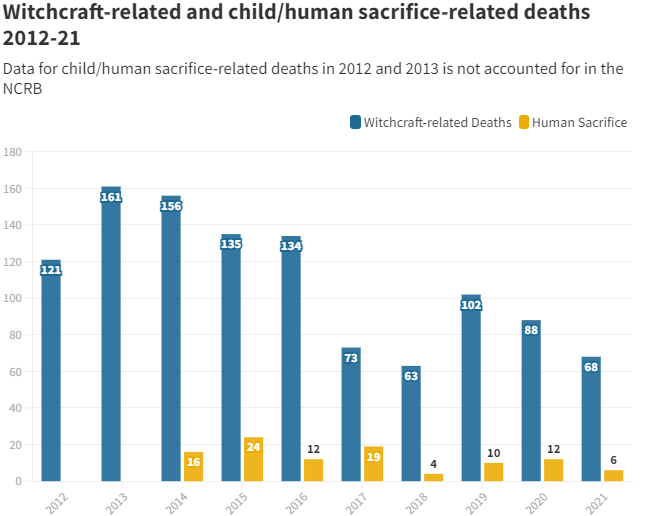Governance
Anti-Superstition Laws in India
- 01 Nov 2022
- 6 min read
For Prelims: National Crime Records Bureau, IPC, Drugs and Magic Remedies Act, 1954.
For Mains: Need for Anti-Superstition Laws in India.
Why in News?
The brutal murders as part of "ritualistic human sacrifices" of two women in Kerala have left the country in shock.
- The murders have sparked a debate about the prevalence of superstitious beliefs, black magic, and witchcraft in India.
What is Superstition?
- It is a belief related to ignorance or fear and characterized by obsessive reverence for reverence for the supernatural.
- The term 'Superstition' has been taken from the Latin word 'Superstitio', which indicates extreme fear of the god.
- Superstitions are not country, religion, culture, community, region, caste, or class-specific, it is widespread and found in every corner of the world.
What is Black Magic?
- Black magic, also known as witchcraft, is the usage of supernatural power for evil and selfish purposes and to perform malicious practices to destroy someone physically or mentally or financially.
- It can be done using the victim's hair, clothes, photo or looking directly into eyes.
How Pervasive are Superstitious Killings in India?
- As per the 2021 report of the National Crime Records Bureau (NCRB), six deaths were linked to human sacrifices, while witchcraft was the motive for 68 killings.
- The maximum number of witchcraft cases were reported from Chhattisgarh (20), followed by Madhya Pradesh (18) and Telangana (11).
- In 2020, India saw 88 deaths due to witchcraft and 11 died as part of ‘human sacrifices’, the NCRB report states.
What are the Related Laws in India?
- In India, there is no central law that exclusively deals with crimes related to witchcraft, superstition, or occult-inspired activities.
- In 2016, Prevention of Witch-Hunting Bill was introduced in the Lok Sabha, but it wasn’t passed.
- The draft provisions included punishment for accusing or identifying a woman as a witch, use of criminal force against a woman, or torture or humiliation on the pretext of performing witchcraft.
- Section 302 (punishment for murder) of IPC (Indian Penal Code) takes cognisance of human sacrifice, but only after the murder is committed, likewise, Section 295A works to discourage such practices.
- Article 51A (h) of the Indian Constitution makes it a fundamental duty for Indian citizens to develop the scientific temper, humanism and the spirit of inquiry and reform.
- Other provisions under the Drugs and Magic Remedies Act, 1954 also aim to tackle the debilitating impact of various superstitious activities prevalent in India.
What are the State-Specific Laws?
- Bihar:
- Bihar was the first State to enact a law to prevent witchcraft, identification of a woman as a witch and eliminate torture, humiliation and killing of women.
- The Prevention of Witch (Daain) Practices Act came into force in October 1999.
- Maharashtra:
- In 2013 Maharashtra enacted the Maharashtra Prevention and Eradication of Human Sacrifice and Other Inhuman, Evil and Aghori Practices and Black Magic Act, which banned the practice of human sacrifice in the state.
- A section in the legislation specifically deals with claims made by ‘godmen’ who say they have supernatural powers.
- Karnataka:
- Karnataka effected anti-superstition law in 2017 known as the Karnataka Prevention and Eradication of Inhuman Evil Practices and Black Magic Act.
- The Act comprehensively counters "inhumane" practices linked to religious rituals.
- Kerala:
- Kerala does not have a comprehensive Act to deal with black magic and other superstitions.
What is the Need for Country-Wide Anti-superstition Act?
- Allowing the unhindered continuance of such practices violates an individual’s fundamental right to equality and right to life under Articles 14 and 21 of the Indian Constitution respectively.
- Such acts also violate several provisions of various international legislations to which India is a signatory, such as the ‘Universal Declaration of Human Rights, 1948’, ‘The International Covenant on Civil and Political Rights, 1966’, and ‘Convention on the Elimination of All Forms of Discrimination against Women, 1979’.
- Only eight states in India have witch-hunting legislations so far.
- These include Bihar, Chhattisgarh, Jharkhand, Odisha, Rajasthan, Assam, Maharashtra and Karnataka.
- In the absence of measures to tackle superstitions, unscientific and irrational practices such as faith healing, quackery, and misinformation regarding medical procedures can also balloon up, which can have severe detrimental effects on public order and health of citizens.
Way Forward
- It is pertinent to remember that bringing a legislation to deal with this social issue shall only mean half the battle won.
- A meaningful reform will need to increase awareness among the masses through information campaigns, and by roping in community/religious leaders to debunk the myths surrounding such practices.
Source: TH







